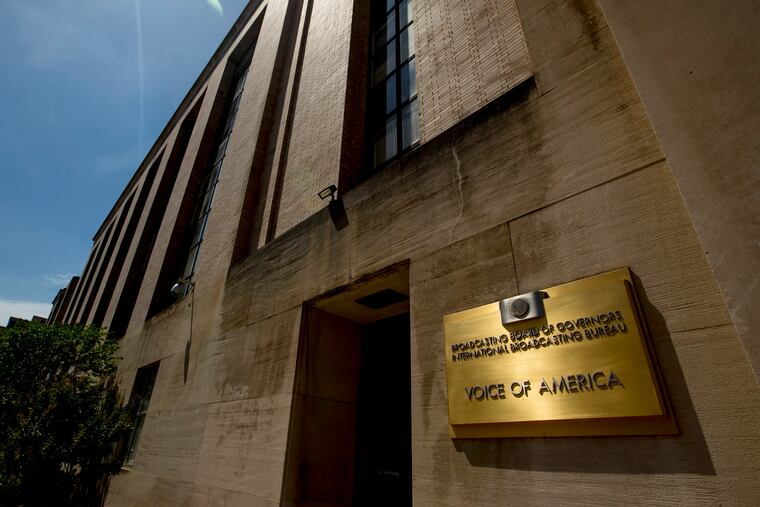The White House could be turning independent Voice of America into Trump radio network | Trudy Rubin
The new head of the U.S. international news effort aims to make an independent agency follow Trump's narrative, and may send foreign Voice of America staffers back to authoritarian states where their lives are at risk.

In the newest White House nod to neo-authoritarianism, President Donald Trump seems bent on remaking Voice of America into Voice of Trump.
This U.S.-funded network was set up Washington in 1942 to broadcast news of America overseas. It was never intended to be a partisan propaganda tool, like state-run Russian or Chinese overseas networks. Nor was it meant to be the voice of one political party.
Rather, its mission was to present foreign audiences with nonpartisan news coverage of our country, ranging from U.S. politics and foreign policy to American culture. Under veteran journalist Amanda Bennett (a former editor-in-chief of The Inquirer), a highly professional staff of U.S. and foreign journalists delivered TV and radio programs to 236.6 million people worldwide.
However, in April, President Trump and his allies started attacking VOA over its (accurate) coverage of the pandemic. Last month, the GOP-controlled Senate confirmed Michael Pack, an ally of Steve Bannon, to head a new U.S. Agency for Global Media that will now oversee VOA and affiliated agencies such as Radio Free Asia and Radio Free Europe/Radio Liberty. Bennett resigned, and Pack immediately purged professionals atop every division, while putting low-level Trump political appointees on the new oversight board in place of bipartisan luminaries.
But the story got even uglier last week, as Pack was reportedly ready to refuse renewal of visas for foreign staff who come from authoritarian states, putting them at grave risk if they are forced to return home.
“No doubt this will put people in danger, but this risk appears of no interest to the administration,” says Ryan Crocker, a former ambassador to Iraq, Afghanistan, and other countries. (Crocker served on the Broadcasting Board of Governors that was replaced by Trump’s new oversight board.)
Many VOA foreign staff come from nations such as Thailand, Russia, China, or Zimbabwe, where the state controls most or all news outlets and represses any independent media. “Many work at VOA because they can’t do real journalism at home due to censorship,” one VOA source told me. These journalists undergo rigorous scrutiny before they are hired by U.S. agencies. Their language skills and contacts at home can’t be replaced by U.S. journalists.
What is particularly sickening is the idea that the White House might send these journalists back to authoritarian countries where VOA is under vicious attack, and those who had worked for the agency would face grave danger. “It takes my breath away,” Crocker told me.
Consider this: On the very day last week that the news broke about Pack’s signaling he wouldn’t approve visa extensions, the Russian State Duma (parliament) was accusing VOA and Radio Free Europe/Radio Liberty of disseminating “destructive, misleading and provocative information,” and its staffers of being “foreign agents.” That, no doubt, is because those outlets were providing Russian listeners with straightforward information about the recent Russian referendum that essentially confirmed Vladimir Putin as president for life — and was reportedly rife with rigging.
Yet, Pack would consider not renewing visas for Russian journalists, nor journalists from other countries where they might face arrest or worse. Perhaps that will gain him a medal from the Russian State Duma. Already, the Kremlin overseas media mouthpiece, RT (formerly Russia Today), has cheered on the White House attack on VOA.
The White House crackdown on VOA is so egregious that even GOP Sens. Lindsey Graham and Marco Rubio have joined a bipartisan group of senators who are already questioning Pack’s methods.
» READ MORE: Trump's blame game with China can't hide his own COVID-19 failures | Trudy Rubin
What really needs to be questioned is whether Trump wants to make VOA into a propaganda instrument to promote his personal agenda abroad.
The way the White House attacked VOA’s China coverage would seem to indicate this is the case.
In April, the official White House website put out a news release charging that VOA “spends your money to promote foreign propaganda.” Trump’s grievance appeared to be a link on a VOA video to an Associated Press news article that described the end of the Chinese lockdown in Wuhan, along with the factual info that the COVID-19 death toll in the U.S. exceeded China’s. (Never mind, as Bennett detailed in a news release, the long list of VOA reports on Chinese secrecy and misinformation on the pandemic.)
If those facts that irritated Trump were “propaganda,” one can only imagine the misinformation on the coronavirus that Trump would like VOA to report to the world. That the U.S. has the “best testing” in the world and has crushed the virus? That Trump has handled the pandemic better than any other leader?
Can you imagine how the world would react to such broadcasts, and how they would reflect on VOA and Trump?
“VOA’s strength is its credibility,” Crocker told me. “You can’t have global respect if you are going to act like every other authoritarian regime, and if the world sees us just like them.”
So watch future developments on VOA, and renewal of foreign staff’s visas as a symbol of how far Trump’s media mania will take him. And whether he will try to turn VOA into a version of Russia’s RT.